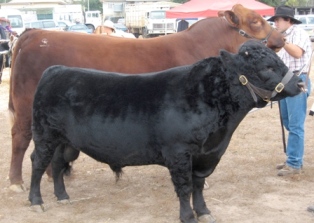Purchasing bulls can be one of the highest costs associated with cattle breeding and running a small beef herd.
Owning a bull
Bulls are the most cost effective when they are mated with the largest number of cows possible, as the cost of the bull can be spread out over a larger number of calves. Bulls can safely be mated with between 40-60 cows. However, for the majority of small landholders this number of cows is out of reach.
Purchasing and mating a single bull is risky as this animal could easily suffer injury, infection or disease and become infertile. Single sire herds also require a replacement bull when the bull’s daughters return to the herd. Owning more than one bull can create cattle management problems. For example, when bulls fight they can injure each other and damage farm infrastructure.
Owners of small beef herds should consider bull/herd sharing, bull hiring and artificial insemination as worthy alternatives to bull ownership.
 |
Bull sharing
Bull sharing involves two cattle farmers buying two bulls together under an agreement. This agreement can include using each other’s bull as a backup every year and/or exchanging bulls after an agreed time period, e.g. three years. Bull sharing reduces both the fertility and financial risk of owning only one bull.
Herd sharing
Herd sharing, in contrast to bull sharing, is where the cow herd is agisted and joined with bulls running in that herd. The financial success of herd sharing depends on the close proximity of larger cattle farms, as cow transport costs can make this option expensive. Be aware that running cattle together requires a merging of property identification codes (PICs) or transferring cattle on the National Livestock Identification System (NLIS) database.
Bull hiring
Some bull owners are happy to lease, hire or rent out bulls to local small beef herd owners. The advantages of not owning a bull include not needing to run it outside the breeding season, being able to rotate bulls annually resulting in greater genetic gain and avoiding the problem of needing to replace the bull when his daughters return to the herd.
The success of bull hiring will depend on a strong relationship with the bull owner and a contract outlining cattle management responsibilities, including an annual bull breeding soundness evaluation (BBSE).
Other considerations include the risk of injury to the bull (who will pay?) and ensuring the cows that the bull is joined to are disease free.
Artificial insemination (AI)
Artificial insemination is an excellent way for owners of small beef herds to introduce new genetics that would normally be too expensive in a cattle breeding program. Costs of AI typically range from $65 to $85 per AI calf. Conception rates from AI are approximately 50% with a second round of AI or a backup bull required to join to the cows that don’t get in calf first time around.
Some small landholders have tried to reduce AI costs by undertaking AI courses ($1500) and doing it themselves. However, AI is a specialist job and inexperienced operators can expect to get lower conception rates. Expensive specialist equipment is also required, including the canister to store semen. Other challenges of AI include the difficulty in detecting cows in heat, low conception rates and increased handling and labour requirements related to the AI process. In most cases it pays to have a professional AI technician or veterinarian complete this job.
Where to from here?
For further information on cattle breeding we recommend you purchase a copy of Beef Ag Guide - Getting Started in Beef or Beef Ag-Skills (A Practical Guide). Both books contain a user-friendly guide to the skills and practices required for beef breeding and production.
N.B Information contained in this article has been adapted from the Beeftalk magazine article 'Bull options for smaller herds' written by the Department of Agriculture, Fisheries and Foresty, Queensland.
 |
The author Charlie Roberts is one of the FarmStyle Australia experts, he runs this website and has a Bachelor of Farm Management and a Masters of Business Administration. He has worked for a number of agricultural companies in both New Zealand and Australia. He has a wealth of experience working with farmers in a range of environments. |



